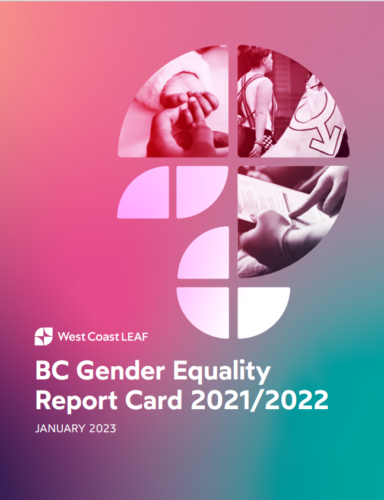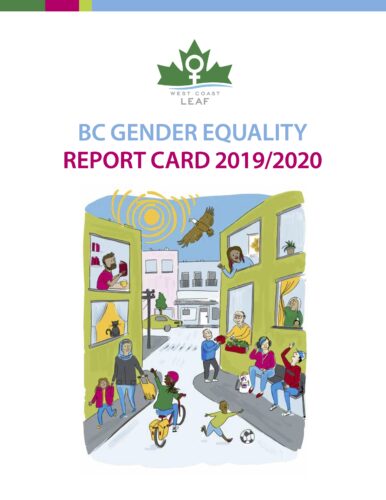
Gender Equality Report Card
About the report card
The Gender Equality Report Card assesses the BC government’s progress in advancing gender equality, by asking: What actions has the government taken? Where is government action overdue? The Report Card can be used to hold the BC government accountable for upholding the rights of all women, trans people of all genders, Two-Spirit, non-binary, and gender non-conforming people, and all people who are marginalized based on gender expression and identity. Over time, our Gender Equality Report Cards have assessed the province’s performance in the issue areas West Coast LEAF focuses on.
To produce the Report Card, we work with communities and advocates across BC to identify issues and to “grade” the BC government’s actions in key areas of social and economic policy. Report Card insights are rooted in the rich lived and living knowledge of community members and organizations who are experts in navigating and transforming BC’s complex landscape of policies and services.
We encourage you to use the Gender Equality Report Card in creative ways as a tool for education and advocacy on human rights and gender justice issues in BC.
What we’re doing
Our latest Report Card assesses BC’s progress in advancing gender equality in 2021 and 2022 in two key areas: economic security and access to healthcare. These issues continue to disproportionately impact people who experience intersecting oppressions based on gender, Indigeneity, race, ability, class, family status, and other aspects of identity and experience. The 2021/2022 Report Card was guided by members of our community partner organizations: Urban Native Youth Association (UNYA), PACE Society, and the Society for Narcotic and Opioid Wellness (SNOW). It also reflects the input of 35 community-based expert reviewers. Read the Gender Equality Report Card 2021/2022.
Building on our history
For 10 years, West Coast LEAF published the CEDAW Report Card annually, grading the BC government on its adherence to the Convention on the Elimination of all forms of Discrimination Against Women (CEDAW) over the prior year. CEDAW is a United Nations (UN) convention that “defines what constitutes discrimination against women and sets up an agenda for national action to end such discrimination.” As the UN CEDAW Committee only reports on Canada every four years, the Report Card would monitor BC’s compliance with CEDAW between reporting periods to hold the government accountable to both UN standards and BC women.
In 2018, we shifted our mandate from focusing only on women, to focusing on all people who are marginalized based on their gender—including trans people of all genders (not only women), Two-Spirit people, people with non-binary gender identities, and gender non-conforming people. Our recent Report Cards reflect West Coast LEAF’s commitment to equality for all individuals who experience gender-based discrimination.
On December 10, 2020 (Human Rights Day), West Coast LEAF published a special edition of the Report Card evaluating BC’s handling of the COVID-19 pandemic. PACE Society, Urban Native Youth Association, and the Coalition Against Trans Antagonism shared their insights to guide our research and analysis for the COVID-19 BC Gender Equality Report Card.
For the first time, the BC Gender Equality Report Card 2019/2020 wove in firsthand knowledge generously shared by members of three community organizations: PACE Society, Urban Native Youth Association, and the Coalition Against Trans Antagonism.
Get in touch
For inquiries about the upcoming Report Card, please contact Humera Jabir (she/her/hers), staff lawyer, at hjabir@westcoastleaf.org.

